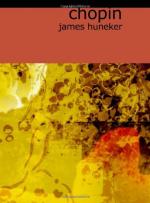III
Chopin is the open door in music. Besides having been a poet and giving vibratory expression to the concrete, he was something else—he was a pioneer. Pioneer because in youth he had bowed to the tyranny of the diatonic scale and savored the illicit joys of the chromatic. It is briefly curious that Chopin is regarded purely as a poet among musicians and not as a practical musician. They will swear him a phenomenal virtuoso, but your musician, orchestral and theoretical, raises the eyebrow of the supercilious if Chopin is called creative. A cunning finger-smith, a moulder of decorative patterns, a master at making new figures, all this is granted, but speak of Chopin as path-breaker in the harmonic forest—that true “forest of numbers”—as the forger of a melodic metal, the sweetest, purest in temper, and lo! you are regarded as one mentally askew. Chopin invented many new harmonic devices, he untied the chord that was restrained within the octave, leading it into the dangerous but delectable land of extended harmonies. And how he chromaticized the prudish, rigid garden of German harmony, how he moistened it with flashing changeful waters until it grew bold and brilliant with promise! A French theorist, Albert Lavignac, calls Chopin a product of the German Romantic school. This is hitching the star to the wagon. Chopin influenced Schumann; it can be proven a hundred times. And Schumann under stood Chopin else he could not have written the “Chopin” of the Carneval, which quite out-Chopins Chopin.




